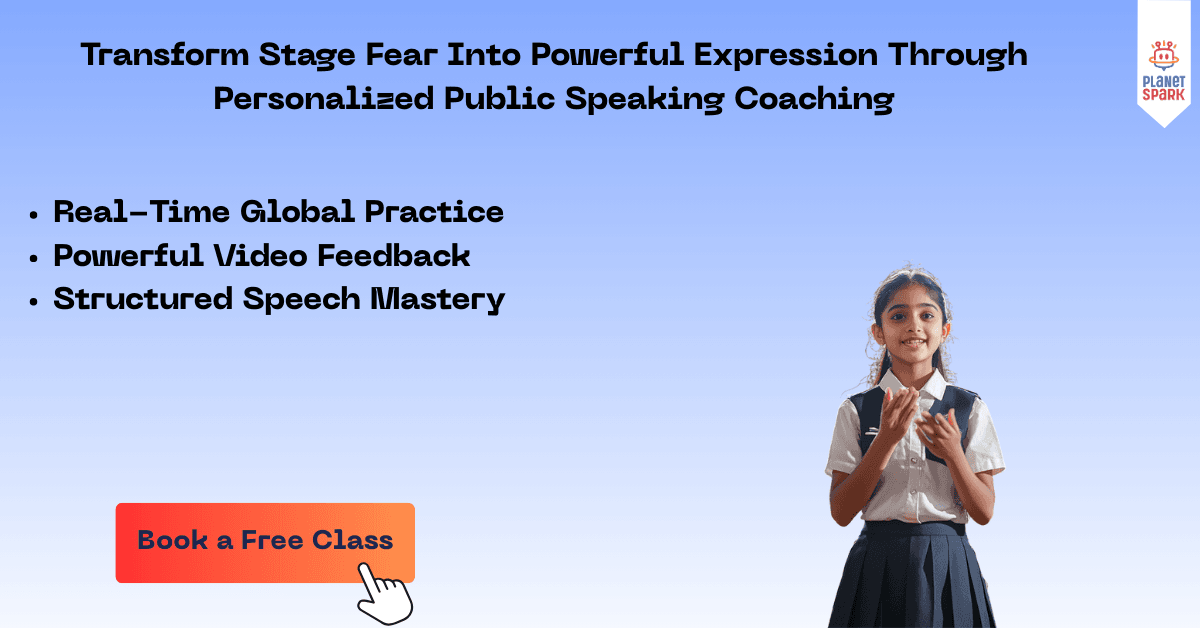10 Public Speaking Tips for Students to Build Confidence
Last Updated At: 20 Aug 2025
10 min read

Table of Contents
- Importance of Public Speaking Skills for Students
- 10 Simple and Effective Public Speaking Tips for Students
- Do’s and Don’ts of Public Speaking
- Can Public Speeches Ever Be Perfect?
- Public Speaking Tips for Kids
- Why Choose PlanetSpark’s Public Speaking Courses for Student
- Conclusion
- Frequently Asked Questions (FAQs)
Public speaking is often seen as one of the most intimidating skills to master. Whether you’re addressing ten classmates in a small group discussion, delivering a speech to your entire school, or presenting in front of hundreds of people, standing on stage can make even the most confident student nervous. Sweaty palms, a racing heartbeat, or a trembling voice, these reactions are all too common when faced with an audience. Research shows that one in five people experience glossophobia, the fear of public speaking, making it the most widespread type of anxiety today.
The good news is that public speaking is not a talent reserved for a select few, it’s a skill that can be learned, refined, and mastered with the right strategies and consistent practice. At PlanetSpark, our Public Speaking Courses for Students are designed to remove that fear by offering 1:1 personalized coaching, AI-driven feedback tools, and gamified learning experiences. With live interactive classes and tailored curricula, students gain the confidence to speak fluently, structure ideas clearly, and engage audiences effectively. If you’re wondering how to overcome stage fright and become a confident speaker, here are 10 simple yet effective public speaking tips for students that you can start using today.
Importance of Public Speaking Skills for Students
Public speaking isn’t just about standing on a stage and delivering a speech, it’s a life skill that impacts almost every aspect of personal and professional growth. Whether you are presenting a project in school, participating in a debate competition, or explaining your ideas in a workplace meeting in the future, effective communication makes a powerful difference. Strong public speaking skills help students express themselves with clarity, boost their confidence, and prepare them for success in academics, leadership, and career advancement.
Here are some reasons why mastering public speaking is important:
1. Helps You Win Over the Crowd
Persuasion is one of the most valuable skills in school, college, and the workplace. When you know how to articulate your thoughts, defend your ideas, and address counterarguments with poise, you naturally gain influence over your audience. Public speaking equips you to make your case strong, build credibility, and win support for your ideas.
2. Motivates and Inspires Others
Great public speakers have the power to inspire. Whether it’s encouraging your classmates to participate in an activity, motivating peers to adopt healthier habits, or driving a group project forward, your words can spark action. Public speaking teaches you how to use storytelling, examples, and persuasive language to positively influence others.
3. Improves Your Ability to Inform
From school presentations and viva exams to workplace pitches and professional training, much of communication is about informing and explaining. Effective public speaking ensures your ideas are not only heard but understood. It helps you organize thoughts logically, present them clearly, and keep your audience engaged.
Now that we understand why public speaking is such a critical skill, let’s move on to the most practical part: how to improve it.

10 Simple and Effective Public Speaking Tips for Students
Public speaking doesn’t have to be overwhelming. With the following techniques, students can gradually build confidence and develop into powerful communicators.
Before the Speech
1. Prepare and Practice Thoroughly
The foundation of any successful speech lies in preparation. Spend time researching your topic, preparing clear notes, and structuring your points logically. But preparation doesn’t stop at writing, it extends to practice.
Rehearse your speech multiple times until you’re comfortable with the content.
Record yourself to identify weak spots in voice modulation, pace, or clarity.
Practice with friends, family, or even in front of a mirror to simulate audience interaction.
Remember: confidence comes from familiarity. The more you practice, the less intimidating the actual speech will feel.
2. Meditate to Calm Your Nerves
Stage fright often stems from overthinking. Meditation and deep breathing can significantly calm nerves.
A simple 10-minute daily routine before your presentation can work wonders:
Close your eyes and inhale deeply, holding your breath for a few seconds.
Exhale slowly while visualizing yourself speaking confidently.
Repeat this process until you feel relaxed and focused.
This not only reduces anxiety but also sharpens your concentration.
3. Join Public Speaking Groups or Clubs
Exposure is key to improvement. By participating in debate clubs, drama societies, or speaking forums, you practice speaking in front of varied audiences. These settings provide constructive feedback, new perspectives, and opportunities to polish your skills.
Experience practical public speaking tips for students with an interactive free trial class.
4. Accept Nervousness as Normal
Even professional speakers experience stage jitters. Instead of resisting nerves, embrace them as a sign of excitement. That small adrenaline rush can boost your performance if you channel it positively. Acknowledge your nervousness, smile, and move forward, it helps you appear authentic and relatable.
5. Understand Your Audience
Great communication is audience-centric. Before crafting your speech, ask:
Who am I speaking to? Classmates, teachers, professionals?
What do they already know about the topic?
What value can I add for them?
Tailoring your content to the audience ensures relevance, engagement, and credibility.
Explore effective public speaking tips for students in a live free trial session.
During the Speech
6. Speak Slowly and Clearly
Rushing through a speech is one of the most common mistakes students make. A slower pace not only makes your message clearer but also gives you time to think. Use strategic pauses after major points to let ideas sink in.
7. Maintain Eye Contact
Eye contact builds trust and engagement. Instead of staring at your notes or slides, look at different sections of the audience. This shows confidence and makes listeners feel personally connected.
8. Add Humor Where Appropriate
A touch of humor can break the ice and make your presentation memorable. Anecdotes, light jokes, or witty observations help the audience relax and keep the atmosphere friendly. Just ensure the humor is relevant and respectful.
9. Use Hand Gestures Effectively
Your body language communicates as much as your words. Avoid fidgeting, crossing arms, or pacing. Instead, use controlled hand gestures to emphasize key points, illustrate concepts, and enhance storytelling.
10. Be Yourself
Audiences appreciate authenticity. Instead of trying to imitate famous speakers, let your personality shine. Share personal stories, speak in your natural style, and interact with genuine warmth. This builds credibility and connection.

Do’s and Don’ts of Public Speaking
✅ Do’s
Carry Note Cards: Use bullet points to stay on track.
Smile and Stay Welcoming: A smile instantly builds rapport.
Practice Regularly: Rehearse until confidence feels natural.
Engage with the Audience: Ask questions, invite interaction.
❌ Don’ts
Ignore the Audience: Acknowledge their cues and questions.
Memorize Word-for-Word: It sounds robotic and uninspiring.
Overuse of Fillers (“umm,” “like”): They distract from your message.
Fidget or Over-Move: Nervous gestures reduce credibility.
Can Public Speeches Ever Be Perfect?
The truth is, no speech is ever perfect. Even history’s greatest orators have stumbled or wished they had delivered a point differently. What makes them great is their ability to learn, adapt, and improve after every attempt.
Instead of chasing perfection, focus on progress. Every presentation you give makes you better than the last. Embrace feedback, practice consistently, and celebrate small wins along the way.
Build confidence with PlanetSpark’s Public Speaking Courses. Start with a free trial session.
Public Speaking Tips for Kids
Building public speaking skills at a young age provides lifelong benefits. Here are some starter tips for children:
Write First, Speak Later: Organize ideas before speaking.
Don’t Obsess Over Grammar: Focus on clarity and confidence.
Try Different Activities: From poetry slams to storytelling, variety builds adaptability.
Learn Storytelling: Narratives make speeches engaging.
Break the Fear Barrier: Start with small, safe audiences and gradually expand.
Why Choose PlanetSpark’s Public Speaking Courses for Students?
While these tips are valuable, structured guidance accelerates growth. PlanetSpark offers a comprehensive Public Speaking Course for students that blends personalized mentorship, advanced technology, and engaging activities to build lifelong confidence.
Here’s what makes PlanetSpark unique:
1. 1:1 Personal Trainers
Every student is matched with a certified communication expert who tailors lessons to the child’s pace, style, and goals. Trainers provide instant feedback on fluency, storytelling, grammar, and delivery.
2. Customized Curriculum & Roadmap
Learning paths are personalized through assessments that identify strengths and gaps. The roadmap evolves as students progress, ensuring steady improvement from basic speaking to advanced public speaking.
3. SparkX – AI Video Analysis Tool
Students record speeches that are analyzed for voice clarity, posture, grammar, and confidence. Detailed reports help track progress and highlight specific areas for improvement.
4. AI-Led Practice Sessions
Virtual AI coaches simulate real-time speaking activities, offering instant feedback on fluency, pacing, and grammar. These sessions make independent practice engaging and effective.
5. Spark Diary for Writing Habits
A personal digital journal where students write reflections, stories, and speeches. It nurtures creativity, clarity, and consistency in communication.
6. Gamified Learning Modules
Interactive quizzes, challenges, and competitive games (like Grammar Guru and Spell Knockout) make practice fun and ensure daily revision.
7. Parent-Teacher Meetings & Progress Reports
Parents receive structured performance updates, ensuring transparency and shared involvement in the child’s journey.
8. Exclusive Clubs & Safe Communities
Debate clubs, writing circles, and moderated sharing platforms allow children to practice, collaborate, and gain peer recognition in a secure environment.
9. Contests and Talent Showcases
Regular competitions and showcases give students real-world stage experience, boosting confidence and recognition.
Conclusion
Public speaking may feel intimidating at first, but with preparation, practice, and the right guidance, any student can transform into a confident communicator. The key lies in starting small, staying consistent, and embracing every opportunity to practice. Whether it’s through personal practice or professional guidance like PlanetSpark’s Public Speaking Courses, students can build fluency, confidence, and a powerful voice that will serve them for life.
Frequently Asked Questions (FAQs)
1. How can students overcome stage fright?
By practicing regularly, meditating, and starting with small audiences, students gradually reduce anxiety. PlanetSpark also uses AI tools and live mentoring to ease stage fright.
2. Why is public speaking important for students?
It builds confidence, improves communication, strengthens leadership skills, and prepares students for academic and professional success.
3. How does PlanetSpark help with public speaking?
Through personalized 1:1 coaching, AI analysis, gamified practice, and real-time feedback, PlanetSpark ensures measurable skill development.
4. Can kids start public speaking at an early age?
Yes! Children as young as 6–7 can start with storytelling, poetry, and debates, which form the foundation for confident communication.
5. How long does it take to improve public speaking?
Progress varies, but with consistent practice and guided training, noticeable improvements can be seen within weeks to months.
6. What are the top qualities of a good public speaker?
Confidence, clarity, storytelling ability, audience awareness, and authenticity are essential traits of effective speakers.
7. Does PlanetSpark provide certifications?
Yes, students receive certifications for participation, contests, and skill mastery, adding value to their academic and extracurricular portfolios.
Download Free Worksheets
Personalized Communication Report
Record a video to get a AI generated personalized communication report for your child
Select Learner's Class

Hi There, want to try these
tips for your child with
LIVE with our expert coach?
Let's check your child's
English fluency

